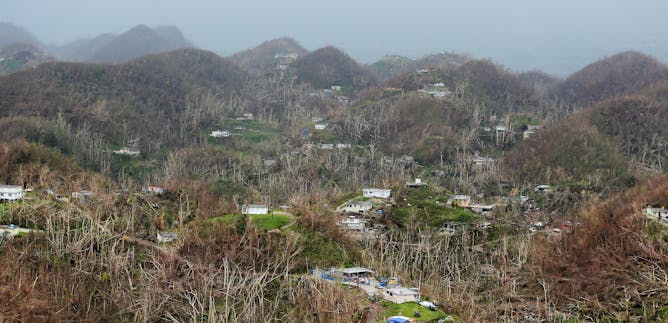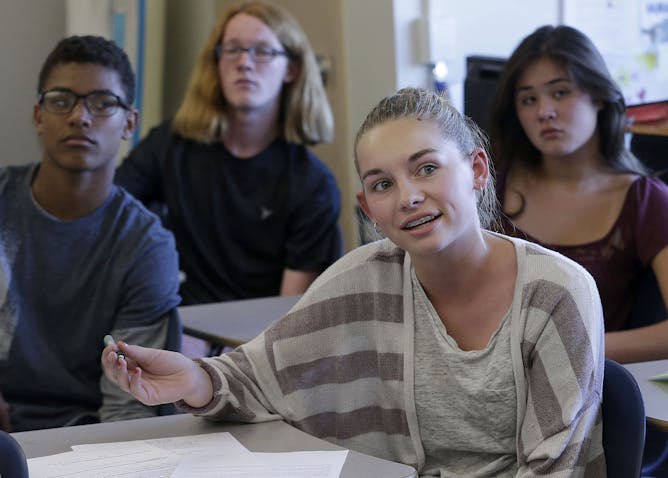| |
|
|
|
|
|
|
| |
|
Editor's note
|
|
With electricity, phone service and internet still scarce in Puerto Rico, it’s been almost impossible for locals to recount their experiences of Hurricane Maria and life after the storm. But Evelyn Milagros Rodríguez, an intrepid librarian at the University of Puerto Rico - Humacao, took on the challenge. Her firsthand account of the humanitarian crisis in Puerto Rico is a tale of survival, struggle and resilience. (And we’re bringing it to you in Spanish, too.)
Many people are starting to worry about what will happen when artificial intelligence gets more capable and starts taking over more jobs than it already has. Kentaro Toyama, a scholar of technology and culture – and former AI researcher – from the University of Michigan, explains why the resulting social upheaval may be greater than in the past.
With allegations of sexual assault and harassment making headlines, three violence prevention scholars at Wayne State University explain that preventing such behavior has to start early with programs geared toward developing healthy norms for kids and young adults.
Finally, the White House on Thursday officially declared the opioid crisis a public health emergency. Our recent series explores the effects of the opioid epidemic and addiction on the U.S.
|
Catesby Holmes
Commissioning Editor
|

|
|
Top stories
|

Hurricane Maria denuded forests in Puerto Rico, revealing once-hidden homes and communities. A graffiti-sprayed saying is now popping up across the island, noting that “Behind the trees live people.”
Lucas Jackson/Reuters
Evelyn Milagros Rodriguez, University of Puerto Rico - Humacao
A Puerto Rican librarian with a personal relationship to hurricanes describes the brutal reality of life on this Caribbean island more than a month after Maria and Irma left their mark. Leer en español.
|

When everyone’s out of a job, will workers unite?
Inspiring/Shutterstock.com
Kentaro Toyama, University of Michigan
As artificial intelligence technology becomes more capable, it threatens more types of jobs – like lawyers, bureaucrats and managers. What social upheaval will happen if those people can't find work?
|

Sex education in some American high schools is evolving to include to curb sexual assaults.
AP Photo/Jeff Chiu
Poco Kernsmith, Wayne State University; Joanne Smith-Darden, Wayne State University; Megan Hicks, Wayne State University
Incorporating lessons on healthy sexual behavior into sex ed classes and special prevention programs for youth could be key to reducing sexual violence, experts say.
|
|
|
|
|
Economy + Business
|
-
Tanya D. Marsh, Wake Forest University
Although 'Game of Thrones' -style funeral pyres are still out of bounds, Americans are increasingly turning to cheaper, greener and more meaningful ways to dispose of their loved ones' bodies.
-
Genevieve Shaker, Indiana University-Purdue University Indianapolis; Robert Christensen, Brigham Young University
By some measures, Americans are giving less to charity through their jobs than they used to. But many companies say that increasing this kind of charity is a priority for them.
|
|
|
|
From our international editions
|
-
Rosemary Stanton, UNSW
Coconut oil is being hailed as the new "superfood", helping us lose weight and kill harmful bugs. But how do the claims stand up to scientific scrutiny?
-
Andrew Roddick, McMaster University
Donald Trump's proposed border wall will destroy historic and ancient sites, violate the rights of Indigenous populations and cause misery to those seeking a better life. What's more? It won't work.
-
Lara Sciscio, University of Cape Town
Until this discovery, theropod dinosaurs were thought to be considerably smaller, at three to five metres in body length, during the Early Jurassic.
|
|
Today’s chart
|
-

 Andrew Kolodny
Brandeis University
Andrew Kolodny
Brandeis University
| | | |
| |
|
|
|
|
|
|
|
|